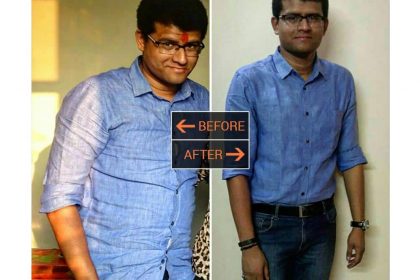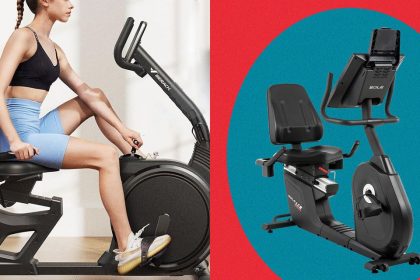If the idea of strength training once conjured young men thrusting a barbell or popping out pullups, the tides have since turned: Lifting, even lifting heavy, has finally gained cultural cachet among women of all ages, thanks to experts who’ve long espoused its benefits for women’s bones, metabolism, and more. But if there’s one part of resistance training that’s worth paying special attention to, particularly if you’re in perimenopause or beyond, it’s leg day. A strong lower body may be key to better brain aging, Louisa Nicola, MMed, a New York-based neurophysiologist who studies Alzheimer’s disease in women, tells SELF.
Nicola points to a 2015 study of 300-plus female twins that revealed a fascinating link: Having more powerful legs—a metric captured by sitting in a machine and pushing one foot as hard and fast as possible against a pedal—is associated with relatively better cognition 10 years later, measured by performance on tests of memory and processing speed.
A subset of the twin pairs who were identical and had significantly different leg power at the start of the study also had brain MRIs done 12 years later; and fitting with the above, the stronger-legged twins had significantly more grey matter and greater activation in certain brain regions during cognitive tasks, reflecting more resilient, better-aging brains. (The benefit of comparing twins? Beyond controlling for health and lifestyle factors, the researchers could also rule out genetics and early-life environment as potential drivers behind the brain differences they spotted, given these are shared between twins.)
And that’s not the only research to suggest ripped legs and a sharp mind go together. A 2018 study of 1500-plus older adults found that those with greater leg strength performed better on tests of executive function (which assess abilities like problem-solving and paying attention). Multiple studies have also suggested a link between faster walking speed—which hinges on high leg strength—and brain power: Having a gait that’s slow or decreasing in speed is connected to drops in certain measures of cognition and greater dementia risk.
Below, Nicola breaks down why having fit legs may support brain health, especially for women, and offers a simple plan to improve leg strength and power.
Why greater leg power is linked with better brain function
Research suggests a few explanations that likely work in tandem, some of which relate to the power aspect and others, to building leg or muscle strength more generally.
For starters, ramping up the power of your legs means recruiting and strengthening type 2 (a.k.a. fast-twitch) muscle fibers, Nicola points out—the kind you need for quick, intense bursts of movement, and also the ones that weaken fastest with age. These muscle fibers rely on glucose for energy, breaking it down into lactate, which can help fuel the brain. And women’s brains get less efficient at creating energy as they enter perimenopause, Nicola says. The boost of lactate that comes from flexing those type 2 fibers “functions as a backup system, supplying the brain with more energy to use for thinking and memory,” she explains.
Building leg power also requires contracting those muscles repeatedly, and as you do so, you’re “releasing a whole host of chemicals called myokines into your bloodstream, which travel up to the brain, cross the blood-brain barrier, and can affect cognitive processes,” Nicola says. One of those helpful chemicals is the often-hyped brain-derived neurotrophic factor (BDNF), which can spark the formation of new brain cells in the memory center of the brain, Nicola points out. That may help stave off some of the shrinkage of this region that happens with age (and which can contribute to dementia).
Because leg muscles are the largest in the body, having strong ones is also a good proxy for doing lots of strength training in general, which has plenty of perks for the brain too. It increases blood flow, which floods your brain with extra oxygen; and it tamps down on the kind of bodywide inflammation that may harm your brain. At the same time, pumping up and maintaining your leg power makes it easier to stay active and avoid falls—which also lowers your dementia risk. And all of these benefits carry even more importance for women, Nicola says, given women account for roughly two-thirds of Alzheimer’s cases.
How to power up your legs and support your brain along the way
The stepping stone to power is strength, so it’s important to start there, Nicola says, particularly if you’re a strength-training newbie. That means learning the basic mechanics of how to squat and deadlift (if you haven’t done so already) and embracing a leg-day workout plan that burns all the key muscle groups of your lower limbs. You might start out with bodyweight exercises to be sure you nail the form, but then you’ll want to incorporate weights—typically, whatever you can lift for 8 to 12 reps—to start building.
From there, the key is to progressively overload your muscles, a.k.a. lift heavier weights. The general rule for a week-to-week increase is to go up by no more than 10% of the weight you’ve been lifting for any given exercise. When you make each jump, it’ll feel tougher to hit the bottom of your rep scheme. Nicola says to aim for the weight you can lift for 8 reps max: “You get to the sixth rep, and you are really exhausted to the point where, if you absolutely had to, you could squeeze out two more reps,” she explains. “That’s where growth happens.”
Once you have a baseline level of strength, then you can boost power, or explosive strength, by practicing plyometric movements (a.k.a. plyos), Nicola says, like pop squats, tuck jumps, and jumping lunges. Pick just an exercise or two to start, with a low rep and set count, and do these moves a couple times weekly, then work up from there as they start to feel less breathy, more breezy. The more comfortable you get with plyos, the more intensity you can inject into every rep, and the bigger physical—and mental—power gains you’ll make.
Related:
- 7 Ways to Protect Your Brain Health as You Age
- This Type of Hobby Can Keep Your Brain Young, New Science Says
- 5 Simple Tests That Can Tell You About Your Longevity
Get more of SELF’s great service journalism delivered right to your inbox.







